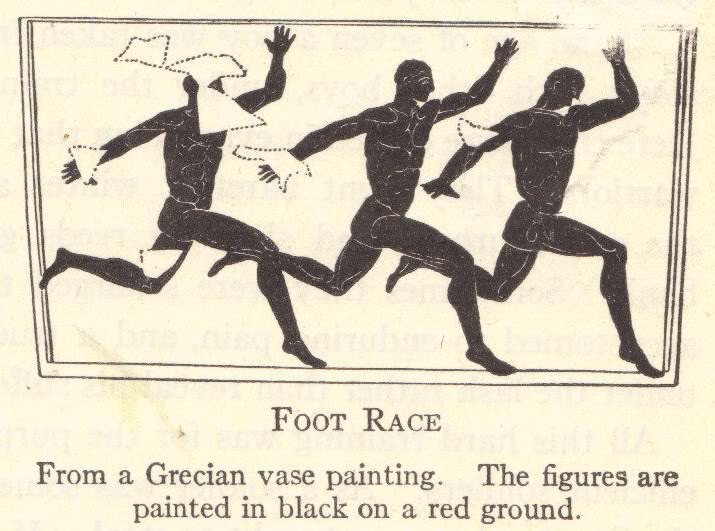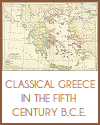| Ancient Greek Foot Race |
|---|
| www.studenthandouts.com ↣ World History ↣ Ancient Greece ↣ Images of Ancient Greece |
Foot Race from a Grecian Vase Painting: The figures are painted in black on a red ground. The ancient Greeks started the Olympics. Athletes competed in the nude. Athleticism held a prominent place in the daily life and culture of ancient Greece. The Greeks valued physical fitness and the pursuit of excellence in sports and physical activities. Click here to enlarge.  Olympic Games: The most famous athletic event in ancient Greece was the Olympic Games, held in Olympia every four years, starting in 776 BCE. These games were not only a celebration of athleticism but also a symbol of Greek unity and culture. They included a variety of competitions, most notably foot races, discus throwing, long jumps, and the pentathlon.
Olympic Games: The most famous athletic event in ancient Greece was the Olympic Games, held in Olympia every four years, starting in 776 BCE. These games were not only a celebration of athleticism but also a symbol of Greek unity and culture. They included a variety of competitions, most notably foot races, discus throwing, long jumps, and the pentathlon. Pan-Hellenic Games: While the Olympics were the most prestigious, there were other Pan-Hellenic games such as the Pythian Games, Nemean Games, and Isthmian Games. These events attracted athletes and spectators from various Greek city-states. Agora (Marketplace) Gymnasium: The ancient Greek agora (marketplace) was not just a commercial center but also a place for social and intellectual activities. It often included a gymnasium, a training ground for athletes. Here, athletes practiced, and philosophers engaged in discussions and debates. Physical Education: Physical education was an integral part of the curriculum in ancient Greek schools. Young boys received training in gymnastics, athletics, and combat skills to prepare them for citizenship and military service. Education and physical fitness were closely intertwined. Nudity in Athletics: Ancient Greek athletes typically competed in the nude. This practice, known as "gymnopaedia," emphasized the idea that the human body was a work of art and should be displayed in its natural form. It also symbolized equality among competitors. Importance of Competition: Competition was highly valued, and victory in athletic events brought fame and honor to the athlete and their hometown. Victors were often celebrated as heroes, and they received olive wreaths as a symbol of their achievement. Diet and Training: Athletes followed strict diets and rigorous training regimens to achieve peak physical condition. They adhered to specific diets that emphasized meat and an abundance of carbohydrates for energy. They also engaged in various exercises, such as running, wrestling, and weightlifting. Professional Athletes: In addition to amateur athletes who competed for honor, there were professional athletes in ancient Greece who participated in various sports. Some were sponsored by wealthy patrons or cities and received monetary rewards for their victories. Women in Athletics: While women were not allowed to participate in the ancient Olympic Games, they had their own athletic competitions, including foot races and discus throwing, in separate events like the Heraean Games. The participation of women in sports varied by region and time period. Physical Well-Being and Philosophy: The Greeks believed in the harmony of the body and mind. Physical fitness was seen as a path to achieving balance and well-being. Philosophers like Plato and Aristotle advocated for the importance of a healthy body in shaping a sound mind. Legacy: The Greek emphasis on athleticism has left a lasting legacy in modern sports and the concept of the Olympic Games. The Olympic tradition was revived in the late 19th century, and the modern Olympics continue to celebrate the athletic spirit and the pursuit of excellence. Athleticism was deeply intertwined with the cultural and philosophical aspects of ancient Greek society, promoting physical well-being, competition, and the development of a harmonious individual. It remains a testament to the enduring importance of sports and physical fitness in human history. |
 |  |  |  |  |  |
| Ancient Greece Books and Films | Ancient Greece Outlines and PowerPoints |
| Ancient Greece Maps and Pictures | Ancient Greece Study Games |
| Ancient Greece Miscellany | Ancient Greece Worksheets |
| www.studenthandouts.com ↣ World History ↣ Ancient Greece ↣ Images of Ancient Greece |








